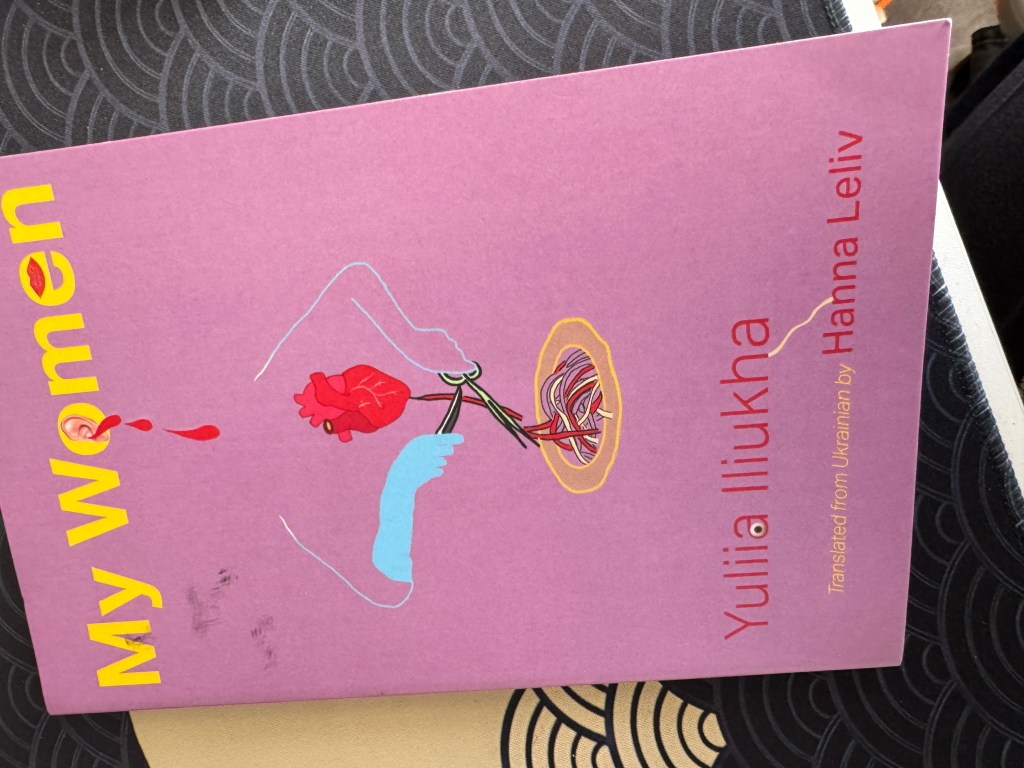
My Women by Yuliia Lliukha
Ukrainian fiction
Original title -Мої жінки
Translator – Hanna Leliv
Source – Personal Copy
I mentioned before I went away that I was planning to work through the shortlist (their longlist really) of this year’s EBRD prize, all the books had arrived before I went away, but the one book that I hadn’t heard of on the whole list, in fact. The publisher was unknown to me. This book was written by a Ukrainian writer. Yuliia Lliukha. She is a writer and columnist from the Kharkiv region of Ukraine. Ukraine. She studied at the Ivan Franko University (I have a novel from Franko in the pipeline to read this year \). She had written some novels before the war in Ukraine, but had a role in the war, raising funds for first aid equipment. She curated the socio-poetic, multimedia project The Mark of Home, a project to support the rehabilitation of Ukrainian war veterans through art and creativity. She compiled the poetry collection of the same name as part of this work.
The woman who was once caught by the air raid siren while she was taking a bath was most afraid of dying like that-without her panties, naked, with wet hair and hairy legs;
afraid that the first responders who would pull her from the rubble would see her white body with cellulite prominent on her thighs and a soft, sagging belly she learned to pull in with corrective underwear and think,
“Who prepares for death like that? She could’ve at least lost a few pounds and worked out for a few months”;
afraid that her neighbors who’d be lucky enough to survive would stand next to the ruins and discuss her chipped manicure and grown-out gray roots, and the old woman who’d always talked behind her back with froth at her mouth when she, happy and tipsy, fluttered out of the black car and waved goodbye to the driver, would say,
“Couldn’t she give some thought to how she’d look in the other world? My dear Irochka would’ve never made such a mess of herself, may her soul rest in peace.”
The opening story caught in the bath
SO this book is a very short story, almost flash fiction and has a clever framing device as each of them is a glimpse into a different woman’s life . Stories within the collection start with The woman who. Then, each is a little snippet of those women’s lives during the war and how it affected 40 different women. Each story is less than two pages long. From the opening a woman caught in the bath during an air raid thinking of been found pantless and with unshaven legs. To a woman who never welcomed her husband back. This tackles the fate of these women, ranging from the small everyday things of war, to those more significant problems like the loss of home and partners. This collection could only be written in the white heart of a war. It has a brutal undercurrent, as these nameless women’s lives are caught in snippets.
The woman who buried her son in a vegetable patch made a cross for him from two pine planks bound together with wire. Her son had bought those planks to fix their house up in spring. But the war broke out, and for some people, spring never arrived.
Her son died instantly. The woman could barely register that.
The first two shells fell somewhere farther away. But a fragment of the third one killed her son as they were running from the summer kitchen toward the cellar. The woman collapsed next to him. She could not even scream.
She only groaned, as if she was the one wounded, and scratched the frozen ground with her nails.
Losing a son or partner is all part of the war
It is hard not to compare this to Alexievich’s work. The comparison is on the back cover of the book. The lack of names and places makes this much more brutal and hard-hitting at times. It captures in Amber a collection of women just trying to get by in the white heat of war. How it affects them all, from thinking of being found with unshaven legs, to losing a husband, home or even homeland. I said there was a reason I wanted to tackle the EBRD prizes for this year. It has been a prize list I have looked at over the last few years. Unfortunately, it crosses over with the Booker longlist. Which is a shame as this prize has a knack of finding visceral, confronting literature that isn’t as well known as it should be, so far both the books I have read from the shortlist have a visceral nature to the writing, that sort of edge I look for in books. I say to you all go look at this year’s list of books, I’m sure you will find a few books you don’t know on this list. Do you have a book you’ve read about the Ukrainian war that has hit you hard like this book has me?
Related
Published by







